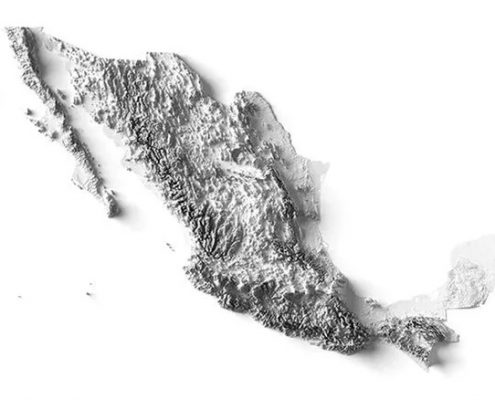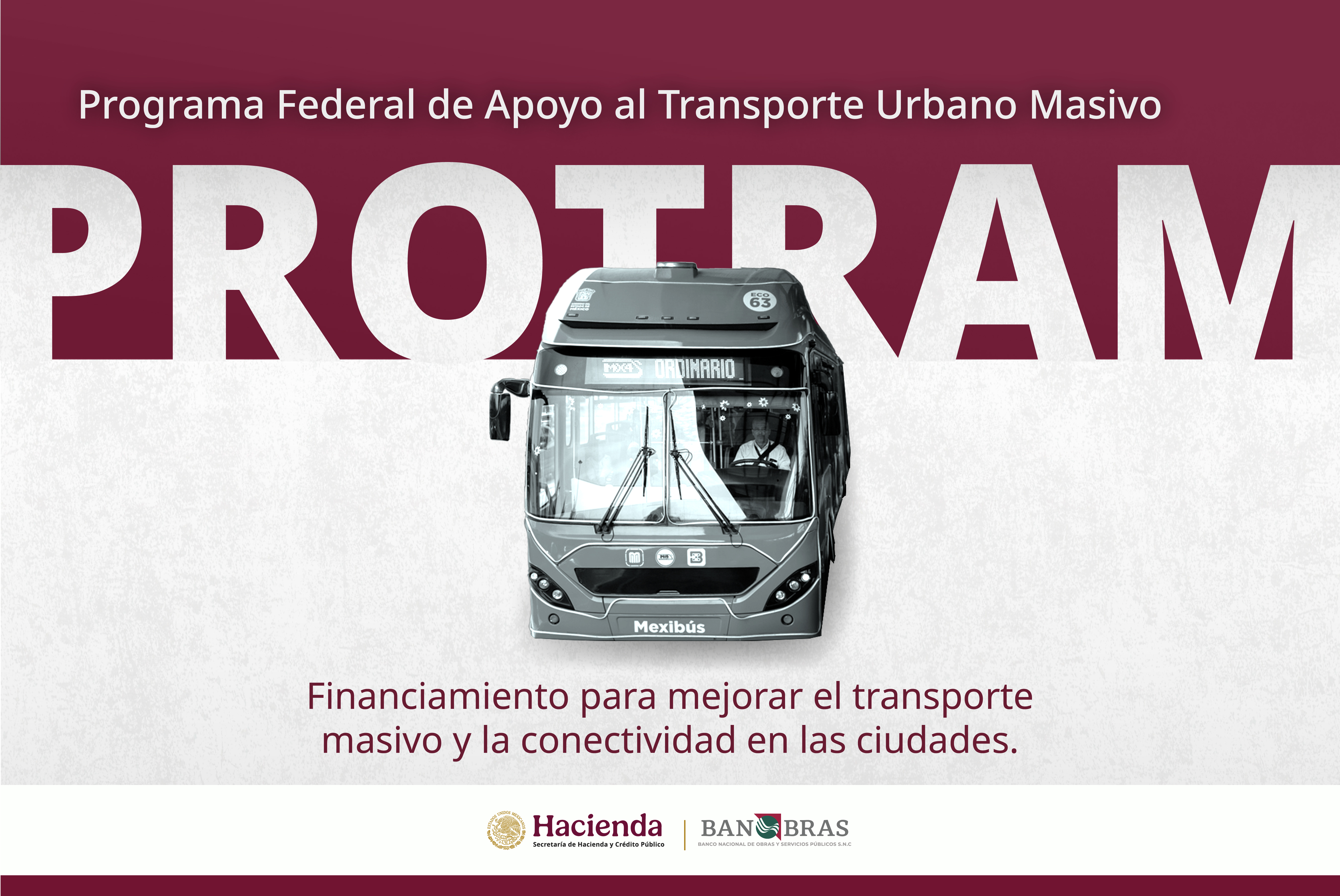Last review: December, 2025
Banobras provides interested parties with information about the sector in Mexico, using data from various sources to offer knowledge and useful elements for decision-making in the field. The presented content does not reflect Banobras’ position.
Science Direct: Towards a green transportation system in Mexico: The role of renewable energy and transport public-private partnership to curb emissions. View document
World Bank: Mexico Green & Resilient Transport. View document
Current status
In December 2020, with the reform of Article 4 of the Constitution to include the Human Right to Mobility, every person in Mexico “has the right to mobility under conditions of road safety, accessibility, efficiency, sustainability, quality, inclusion, and equality.” Following this change, the General Law on Mobility and Road Safety was drafted, which came into effect in May 2022, and established the creation of the National Mobility and Road Safety System (Sistema Nacional).
According to the document “National Policy on Urban Public Collective Transport” from the Secretariat of Agrarian, Territorial and Urban Development (SEDATU), people’s mobility arises as a response to the need to move across the territory to carry out everyday activities in educational, work, care, commercial, recreational, and service sectors, among others. To meet this demand, it is essential to provide a transportation supply that combines both means (physical urban infrastructure) and modes (services/vehicles).
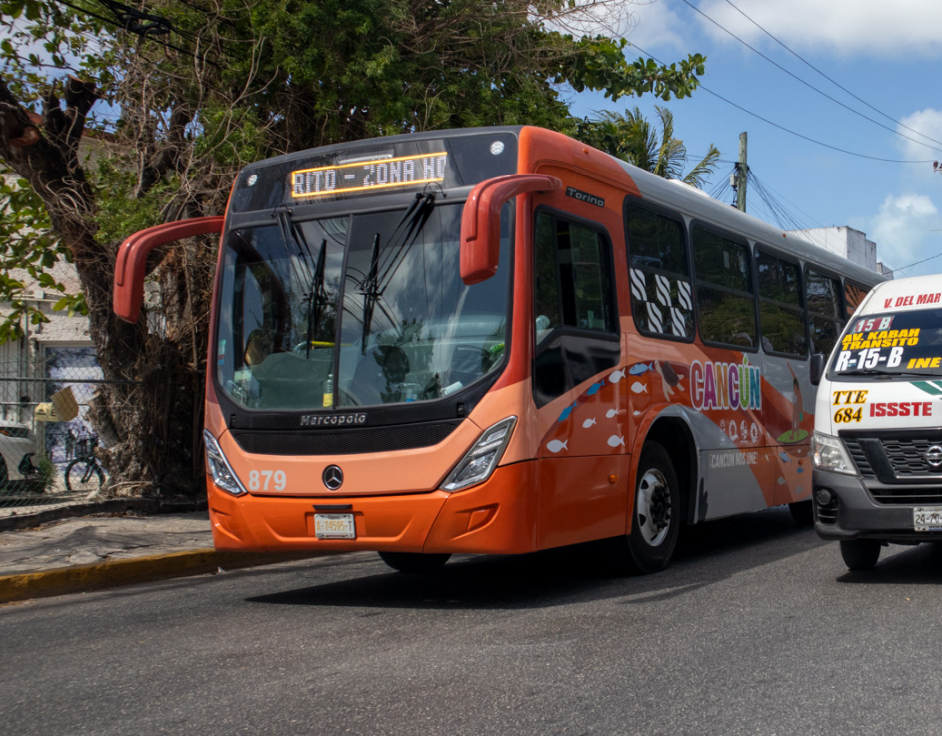
Source: SEDATU, National Policy on Urban Public Transport
In Mexico, around 130 million trips are made daily, of which nearly 80% are by public transportation. Mexican families spend an average of $1,011 pesos per quarter on public transport. Families in the tenth decile, those with the highest incomes, allocate an average of 11% of their income to transportation, while families in the first decile, those with the lowest incomes, spend an average of 21% (National Institute of Statistics and Geography [INEGI], 2020).
Public transportation as a whole enables the daily travel of more than 21 million 264 thousand people. Medium and low-capacity collective public transport serves 89% of passengers, while mass transit systems (such as the subway, commuter trains, and light rail), in conjunction with medium-capacity systems like BRT (Bus Rapid Transit), trolleybuses, and trams, transport 11% of daily demand, equivalent to 2 million 359 thousand people per day (National Institute of Statistics and Geography [INEGI], 2021).
Additionally, the International Association of Public Transport (UITP) emphasizes the importance of public transportation in Mexico. According to the publication “Public Transport in Mexico Towards 2030”, 96% of people travel between states by bus, 43% of workers commute to their workplaces using urban transportation, and 27% of students use public transport. Furthermore, 83% of road freight is transported by trucks, and 100% of product distribution and delivery is done by trucks.
According to INEGI’s “Urban Passenger Transport Statistics (ETUP)” report, which outlines the characteristics of structured urban passenger transport systems in major metropolitan areas, such as the number of passengers transported and kilometers traveled, in June 2025, 239.7 million passengers traveled on urban transport systems, a 9.5% increase compared to the previous year.
The Secretariat of Agrarian, Territorial, and Urban Development (SEDATU) offers the “Territorial and Urban Information System (SITU)” to interested individuals. This digital platform allows the storage, organization, processing, and dissemination of updated geographic, documentary, and statistical information for the design and implementation of public policies in areas such as land use planning, urban development, housing, mobility, agrarian development, cadastre, and other related topics.
SITU is a valuable tool for decision-making in territorial planning and urban development, enabling the design and implementation of more effective public policies.
Institutional Arrangement
In terms of infrastructure, Mexico has a defined strategy that offers investors medium and long-term visibility regarding the development of projects, through a series of plans and programs of national and sectorial scope. To access the information, please consult the following documents:
Communications and Transportation Sector Program 2020-2024
Organizational Structure
Description of the hierarchy and roles of the different entities and actors involved in the sector, including how the different institutions and agencies coordinate and collaborate.
SEDATU drives the country’s sustainable and inclusive territorial development by designing, coordinating, and implementing land management policies, agrarian development, and urban housing development, with a transversal approach and alignment with the National Development Plan, in order to improve the well-being of the population residing in or passing through national territory.
Consult Actions and Programs
Area of SEDATU responsible for ensuring proper urban development, consolidating compact, productive, competitive, inclusive, and sustainable cities.
States and municipalities are responsible for providing public transport systems.
The Federal Government, through the National Infrastructure Fund (FONADIN), created the Mass Transport Support Program (PROTRAM), which aims to support the structuring and financing of urban transport projects, as well as improve the institutional capacity of states and municipalities in managing such projects.
Legal system
The compilation of international treaties, laws, regulations, decrees, agreements and federal, state and municipal provisions shown here are for informational purposes and for ease of reference:
SICT
Public Works and Related Services Law
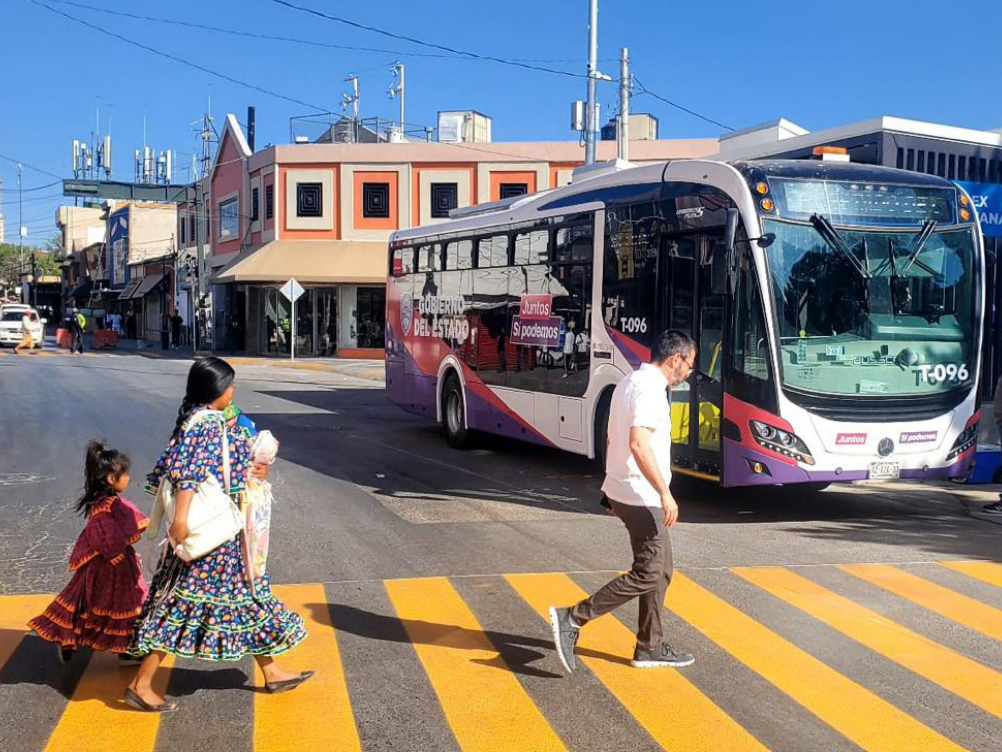
Source: National Policy on Urban Public Collective Transport. SICT-SEDATU
Investment cycle
The following section provides an overview of the project development process from initial planning to final execution.
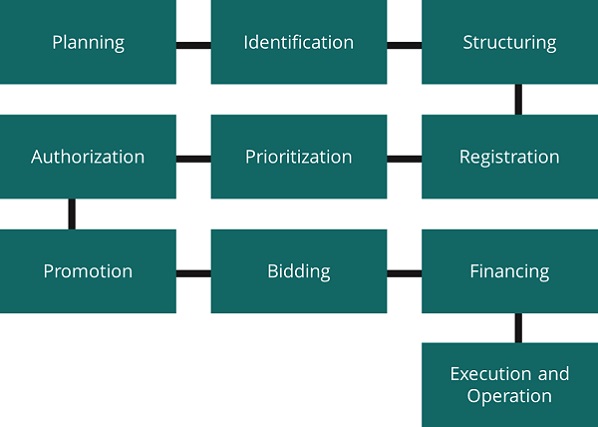
Planning
Based on the objectives and strategies defined in the National Development Plan and the National Infrastructure Program, SEDATU develop short-, medium-, and long-term sectoral programs for the development of mass transport infrastructure. The information contained in the National Urban Development Program primarily aims to:
i) Control the expansion of urban areas and consolidate cities to improve residents’ quality of life.
ii) Establish an urban development model that enhances citizen well-being while ensuring social, economic, and environmental sustainability.
iii) Promote a sustainable mobility policy that enhances the quality, availability, and accessibility of urban travel.
Additionally, local governments have comprehensive mobility and urban development plans.
Identification
Based on planning documents, state and municipal governments, SEDATU, identify urban transport projects for development.
Structuring
Local governments conduct the necessary studies and analyses to structure the projects. FONADIN supports the financing of these studies.
Registration
SEDATU, submits to the Investment Unit of the Ministry of Finance and Public Credit (SHCP) the request for project registration in the portfolio for urban transport projects requiring federal public funds (PEF or FONADIN).
Prioritization
Projects requiring federal budgetary resources must be analyzed by the Intersecretarial Commission on Public Spending, Financing, and Divestment (CIGFD), which determines their inclusion in the PEF. The CIGFD prioritizes projects based on:
i) Socioeconomic profitability
ii) Reduction of extreme poverty
iii) Regional development
iv) Alignment with other investment programs and projects
Authorization
- Projects funded by the PEF are authorized by the Chamber of Deputies.
- Projects funded by FONADIN are authorized by the decision-making bodies of that trust fund.
Promotion
Managed by local governments.
Bidding
Managed by local governments.
Financing
Various funding sources are available depending on the specific characteristics and financial structure of each project, including PEF, FONADIN, the National Bank of Public Works and Services (BANOBRAS), commercial banks, and private developers.
Execution and Operation
Carried out by the awarded operators and/or developers, who are supervised by local governments according to the contract terms.
Projects
Information on new projects (pre-investment, bidding and execution) and in operation within the Mexico Projects Hub platform, which at some stage of the project were considered investment opportunities and do not necessarily have Banobras / Fonadin participation.
New Projects
| Project | Sector | Subsector | Stage | Sustainability | With Ally Networks |
| 0914 Integral Mobility Model of the South Zone of the Metropolitan Area of Guadalajara (Line 4) | Transport | Urban Mobility | Execution | Yes | Yes |
| 0148 Multi Modal Transfer Station (CETRAM) Observatorio | Transport | Urban Mobility | Execution | No | No |
Projects in Operation
| Project | Sector | Subsector | Stage | Sustainability | With Ally Networks |
| 0921 IETRAM: Integrated Transportation System in Merida | Transport | Urban Mobility | Operation | Yes | No |
| 0891 Integral Modernization of Trains, Control System and Tracks of Line 1 of the Collective Transportation System | Transport | Urban Mobility | Operation | Yes | Yes |
| 0696 Multi Modal Transfer Station (CETRAM) Martín Carrera | Transport | Urban Mobility | Operation | Yes | No |
| Project | Sector | Subsector | Stage | Sustainability | With Ally Networks |
|---|---|---|---|---|---|
| 1036 Mexico City Cablebús Line 4 | Transport | Urban Mobility | Execution | No | No |
| 1035 Ixtapaluca Trolleybus | Transport | Urban Mobility | Execution | No | No |
| 1032 Mexico City Cablebús Line 6 | Transport | Urban Mobility | Execution | No | No |
| 1031 Mexico City Cablebús Line 5 | Transport | Urban Mobility | Execution | No | No |
| 0148 Multi Modal Transfer Station (CETRAM) Observatorio | Transport | Urban Mobility | Execution | No | No |
| Project | Sector | Subsector | Stage | Sustainability | With Ally Networks |
|---|---|---|---|---|---|
| 0921 IETRAM: Integrated Transportation System in Merida | Transport | Urban Mobility | Operation | Yes | No |
| 0914 Integral Mobility Model of the South Zone of the Metropolitan Area of Guadalajara (Line 4) | Transport | Urban Mobility | Operation | Yes | Yes |
| 0891 Integral Modernization of Trains, Control System and Tracks of Line 1 of the Collective Transportation System | Transport | Urban Mobility | Operation | Yes | Yes |
| 0696 Multi Modal Transfer Station (CETRAM) Martín Carrera | Transport | Urban Mobility | Operation | Yes | No |
Banobras / Fonadin
Project Finance: In order to support the financing of infrastructure projects and public services, the Project Finance Unit structures financing supported by the granting of loans and guarantees to those projects developed as Public-Private Partnerships and which have their own source of payment from the exploitation of the concession or public contract or from the collection of the service in question. The Public-Private Partnership schemes may be Federal and/or Local, in their different modalities, such as: Concessions, Service Provision Projects (PPS) or Financed Public Works Contracts, among others.

Financing for States and Municipalities and Decentralized Public Organizations: The products and services are designed to meet the infrastructure needs of states, municipalities and their decentralized public organizations, in order to improve the quality of life of the population and increase competitiveness.
Infrastructure is a pillar of development, which is why Banobras has innovative products and services focused on contributing to regional development through the promotion of financial mechanisms to:
Boost investment in infrastructure and public services.
Promote the financial and institutional strengthening of states, municipalities and decentralized public agencies.
To this end, Banobras has the following financing schemes:
Products:
Project Development: Banobras offers services aimed at assisting public sector agencies and entities in the development of infrastructure projects.
Financial structuring of the project:
- Elaborate and/or update studies required by the Public-Private Partnerships Law.
- Support in the review of the bidding conditions and contract model.
- Assist in obtaining financing for the project.
- Assist in the registration process of the project in the portfolio of the Investment Unit of the Ministry of Finance and Public Credit (SHCP).
- Assist in dealing with any observations made by the SHCP Investment Unit.
- Support in the financial closing of the project.
The Federal Mass Transport Support Program (PROTRAM) of the National Infrastructure Fund (FONADIN) provides recoverable and non-recoverable financial assistance to public and private sector entities for the contracting of studies and investments in Mass Transport Infrastructure Projects, preferably in cities with populations of over 500,000 inhabitants.

The program aims to provide financial support to local governments for urban mass transport projects with private sector participation; and to strengthen the institutional capacity of local authorities responsible for planning and regulating public transportation, as well as their business organization.
Sustainability
Banobras makes available to interested parties, analysis sheets for the detection of sustainability practices in infrastructure projects, in accordance with the methodological framework “Attributes and Framework for Sustainable Infrastructure” of the Inter-American Development Bank (IDB). Its objective is to highlight sustainable practices, encourage their adoption in future projects and provide relevant information for investors in their economic, environmental, social and institutional dimensions.
To consult the projects that already have a sustainability record, select the “SEARCH CRITERIA>” option in the PROJECTS section, and then select “With Sustainability Analysis”; the projects that have a record will be displayed below.
In addition, Banobras offers an analysis tool that presents the potential relationship of the different infrastructure projects of the Mexico Projects platform with the 17 Sustainable Development Goals (SDGs) of the 2030 Agenda and their targets. This comparative analysis facilitates the use of data according to different criteria, such as the potential impact of projects and sectors against national and global development goals.
The comparison is only made between projects in the same subsector. To select and consult here.
The alignment of a project with the SDGs provides information on the degree of focus on sustainability; it provides a comparison between projects in the same sector and sub-sector and facilitates investment decisions, showing the highest and lowest alignment of projects to the SDGs. Comparative analysis facilitates the use of data according to different criteria, such as the potential impact of projects and sectors against national and global development goals.
In the case of the sector, 4 projects are identified in the platform that have sustainability practices detection sheets, which allows to know, among other things, the projects with more and better alignments to the SDGs. For more information, access the Sustainable Development Goals application:
Greater alignment of the sector:
- SDG 11: Sustainable Cities and Communities
- SDG 8: Decent Work and Economic Growth
- SDG 9: Industry, Innovation, and Infrastructure
Reduced alignment of the sector:
- SDG 2: Zero Hunger
- SDG 4: Quality Education
- SDG 14: Life Below Water
Ally Networks
Banobras, through its Ally Networks application, provides information on companies participating in competitive public procurement processes for infrastructure projects in Mexico, based on official sources such as ComprasMX. It includes details on investment amounts, number of participations in bids, projects awarded, consortiums, and business associations, which allows the user to identify potential actors for the establishment of investments in the country.
To consult the projects that have information on the participating companies, select the option “SEARCH CRITERIA>” in the PROJECTS section, and then select “With applicant companies” at the end of the criteria.
In the application, you can consult on the sector:
- 2 projects
- 15 companies
- 3 consortiums
- 2 Projects
- 15 Companies
- 3 Consortiums
Reference documents:
This section offers documents, reports and reports with technical, statistical and regulatory information on the sector:
Official statements:
2025
- 05/08/2025 DOF: AGREEMENT delegating powers to the head of the Undersecretariat of Communications and Transport of the Ministry of Infrastructure, Communications and Transport.
- 02/12/2025 SEDATU: SEDATU and the government of Mexico City sign an agreement to implement the Housing for Well-Being Program.
- 02/10/2025 SEDATU: SEDATU announces the start of works for more than 50,000 homes in February, March, and April 2025.
- 01/17/2025 DOF: DECREE issued establishing the Internal Regulations of the Secretariat of Agrarian, Territorial, and Urban Development.
Additional information:
2024
- Science Direct: Towards a green transportation system in Mexico: The role of renewable energy and transport public-private partnership to curb emissions
- World Bank: Mexico Green and Resillient Transport
- Comisión Ambiental de la Megalópolis: Diagnosis to promote electric mobility projects in the Megalopolis
- SICT – SEDATU: National Policy on Urban Public Collective Transport
- SEDATU: The Digitalization of Public Transport in Mexican Cities
- SEDATU: Green I Want You Green, best practices for sustainable urban mobility in Mexico
- Secretariat of Economy: Data Mexico – Urban and Suburban Collective Transport, Fixed-Route Passengers
- SICT: Sectoral Program for Communications and Transport | Progress and Results January 2024 – June 2024
- SEDATU: Metropolitan Bulletin, third quarter of 2024

